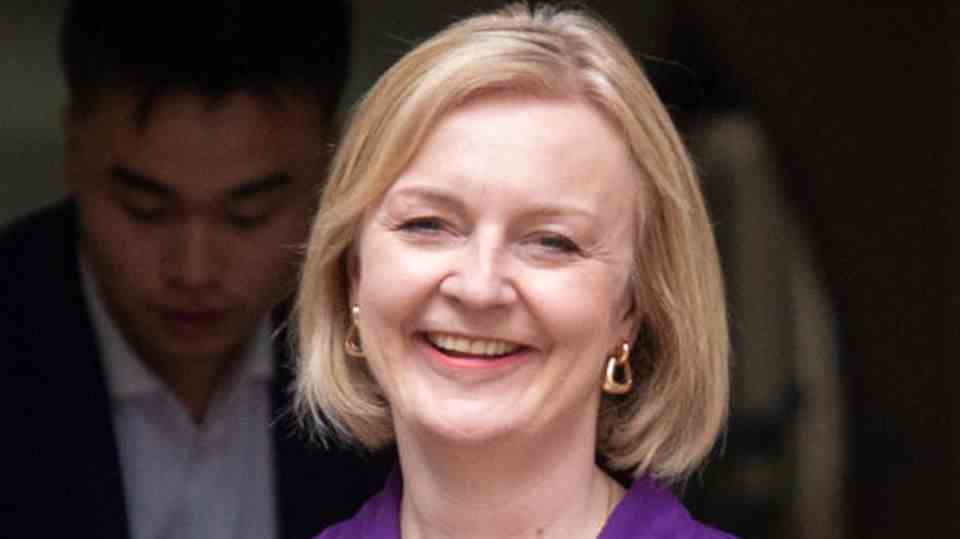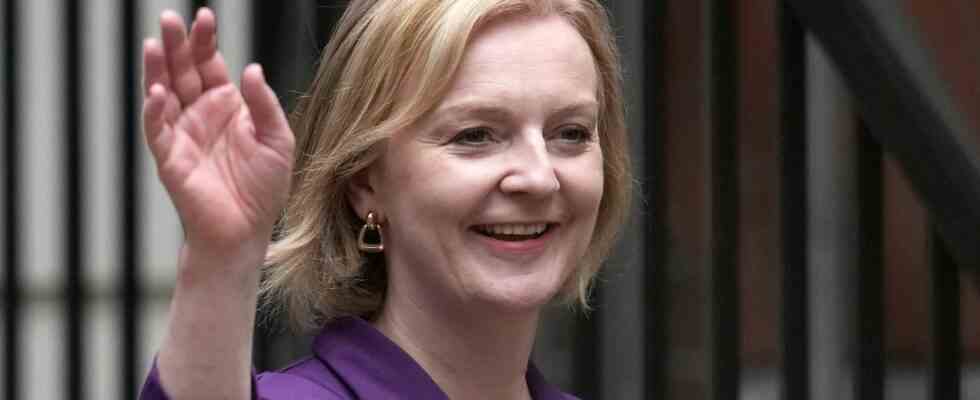With the future Prime Minister Liz Truss, the British Conservative Party wants to shake off the scandal-ridden years under Boris Johnson. This is how the German press commented on the choice of the 47-year-old.
Liz Truss becomes the new British Prime Minister, succeeding Boris Johnson at Downing Street. The former foreign secretary won the British Conservatives’ internal party vote with 57 percent of the vote, while her opponent, former finance minister Rishi Sunak, got 43 percent. Truss promptly announced a “bold plan” for tax cuts and growth. The 47-year-old is the third woman to lead the UK government, after Margaret Thatcher and Theresa May.
This is how the German press commented on the choice of Liz Truss:
“Rhein-Neckar-Zeitung” (Heidelberg): “Nobody Loves the Kingslayer: And so it’s no great surprise that Liz Truss prevailed against Rishi Sunak, who was always ahead of her in five polls within the faction. The grassroots favorite prevailed. And yet Truss draws with one handicap in Downing Street: Not even the ultimately hapless Ian Duncan Smith had such a poor election result as Tory boss in 2001. (…) The rhetoric towards the former EU partners across the English Channel – almost hostile. Instead of British understatement, powerful hubris ( the Tories as ‘greatest party on the planet’) – very much in the style of predecessor Johnson, whom many wanted to chase to hell, but to whom Truss has always remained loyal and whom she continues to call ‘my friend’.If and how much of that will change , the next few weeks and months will show. Your difficult standing in the parliamentary group and party hardly speaks for a cosiness course.”
“Nuremberg News”: “Liz Truss was not elected by the people, but only by a small number of Britons, namely exactly 81,326 members of the Conservative Party. In order to win, Truss presented a program that had a lot to do with the wishes of the base but little with the reality of life among the people Citizens have to do. On Tuesday, the Queen will appoint her as Prime Minister and the problems awaiting the new head of government are huge. Liz Truss has stylized herself as Margaret Thatcher’s heiress and her arrival at Downing Street signals a shift to the right in London. It would be a disaster, Scottish Prime Minister Nicola Sturgeon had warned, ‘if Truss were to govern as she campaigned’.”
“Southwest Press” (Ulm): “The Conservatives have already suffered serious defeats in by-elections. Johnson, whom Truss praised as a ‘good friend’ in her acceptance speech, is, according to opinion polls, the ‘worst prime minister’ in recent decades and Truss a willing cabinet mate for his catastrophic policies. Unlike Johnson “Truss lacks the initial wit, charm, and original rhetoric of her former boss, but comes across as wooden and monotonous. Her arguments for how to fix the moot are unconvincing outside of the ultra-conservative wing of her party.”
“It is questionable that Liz Truss will bring the hoped-for new beginning”
“Frankfurter Allgemeine Zeitung”: “Liz Truss is the acting Foreign Secretary and has gained experience in other government offices. But the British still don’t really know who the members of the Conservative Party have put in front of them until the general election. (…) She has every distancing from Boris Johnson avoided and thus also implicitly approved of his daring handling of the truth. Truss will have to reckon with the fact that Johnson will try to continue to pull the political strings in the background. This will be the new head of government’s first major test. It should be seen until proven Don’t underestimate the opposite. (…) This points to another problem. The Conservative Party has now voted with the ‘gut’ and sovereignly ignored the rest of the country. (…)”
“Cologne City Gazette”: “However, it is questionable whether Liz Truss will bring the hoped-for fresh start for the party, which should guarantee the Tories a victory in the next election. In her election campaign, she primarily wanted to please the grassroots instead of finding solutions to the concerns of the British. To Johnson not only reminds her that she made promises. Truss continues his populist style of politics, but unlike her predecessor, she is neither charismatic nor particularly popular.”
“Leipziger Volkszeitung”: “What is certain is that the new British Prime Minister Liz Truss will quickly announce concrete measures in the coming days to help people in the face of skyrocketing energy bills. Truss is taking a sensible course which – contrary to what she announced – also includes tax increases If she does, she could go down in history as the one who got the country through the crisis because of the scale of the current problems. So far, however, there is nothing to suggest that Truss is the right person to tackle problems of this magnitude.”
“Free word” (Suhl): “In any case, the United Kingdom will now have to prepare for even more turbulent times. If Truss follows its own rhetoric, enormous collisions are in sight. The reality of the social and economic crisis, which it has so far resolutely turned its back on, will quickly overshadow everything. Bitter labor disputes, particularly in the public sector, signal an autumn and winter of widespread discontent, protests the likes of which Britain has not seen in decades.”

“Schwäbische Zeitung” (Ulm): “Liz Truss has fought her way to the top on the back of her party’s hard nationalist right. She wants to lower corporate taxes, relieve the burden on the rich, wage a trade war with the EU, give the Scottish nationalists the finger. The blatant social inequality is likely to increase: on the On the back of working people, the classic Tory clientele of retirees are getting subsidies, while young people find the dream of owning their own home elusive.With real wages plummeting and double-digit inflation, professionals from railroad workers, criminal defense lawyers, teachers and universities have “Industrial action has been announced from teachers to nurses. Fewer and fewer Scots and Northern Irish see their future in union with England. All the signs are that the Kingdom is in for hard times, including political unrest, under a new government that is sliding even further to the right.”
“Hessian/Lower Saxony General” (Kassel): “Britain has huge concerns. The island is in an economic crisis, inflation is extreme, the shortage of skilled workers has become even greater as a result of Brexit. And the public health system has been so badly saved that some people in the country have to pull their teeth themselves because “No dentist is taking in patients anymore. Ultimately, Truss will be measured by the electorate on how to deal with such painful crisis phenomena. And mainland Europe? For the time being, we will have to wait and see whether the Brexit advocate Truss will drive the confrontational course of her predecessor towards the European Union. It is to be feared, because Foreign policy also serves to distract attention from the misery at home. Truss’ teacher Boris Johnson was at least a master at that.”
“The ‘mother of all democracies’ would have wished for a more upright daughter”
“Augsburg General”: “Now that Liz Truss is moving into Downing Street, it’s unclear if she understands the gravity of the situation. Too often in the past has she switched positions, promising pretty much anything and scrambling to win the favor of the Conservatives Party members always in view of what will benefit the higher earners in the country: tax cuts and deregulation, in the spirit of ex-Prime Minister Margaret Thatcher, who emulated Truss not only visually but also rhetorically.In Downing Street, Truss must now decide for whom she wants to do politics: for the 160,000 Tory members, the majority of whom are considered old, white and wealthy, or for all 67 million Britons, many of whom are feeling the effects of the economic crisis directly.”
“Frankfurter Rundschau”: “If you think of Liz Truss, Robert Musil and Alberto Moravia come to mind: ‘The Man Without Qualities’ and ‘The Conformist’. The two novels from the first half of the 20th century only provided men as (minor) acting subjects “In this respect we are further today: The character catastrophe is now emancipated. Friendly people may object: Truss’ agility means that she can act in a situation-specific manner in the sometimes volatile, sometimes fluid political world situation and does not have to defend herself with ideological blinders. But it stays : One of the great industrialized nations of the world is led by a person who delights first and foremost in pleasing all those who can be of use to her, and snubs all those whom she despises and fears as an obstacle or competitor, the ‘Mother of All Democracies’ would have wished for a more upright daughter.”
“Stuttgart Newspaper”: “Industrial struggles, particularly in the public sector, signal an autumn and winter of general resentment. Protests loom the likes of which Britain has not seen in decades. Millions of livelihoods depend directly on which course Truss takes, which she pursues. And while the opposition is already warning of a completely unnecessary trade war with the continent, should all diplomatic ropes in the Brexit dispute tear, Truss’ critics in their own camp see the cohesion of their own Union at risk, because in Scotland, whose government Liz Truss is willing to ignore, “New, national resistance is stirring. The current shift to the right in London is providing fresh nourishment. Those who hoped for a new start among the Conservatives from Boris Johnson’s replacement may have imagined this start a little differently.”


